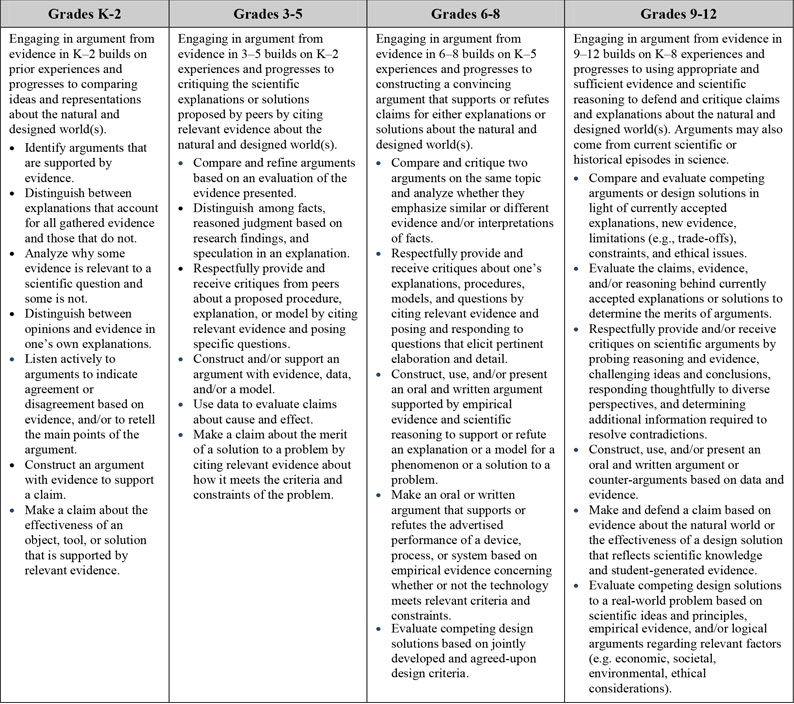Science
In science, reasoning and argument are essential for identifying the strengths and weaknesses of a line of reasoning and for finding the best explanation for a natural phenomenon. Scientists must defend their explanations, formulate evidence based on a solid foundation of data, examine their own understanding in light of the evidence and comments offered by others, and collaborate with peers in searching for the best explanation for the phenomenon being investigated.
Engineering
In engineering, reasoning and argument are essential for finding the best possible solution to a problem. Engineers collaborate with their peers throughout the design process, with a critical stage being the selection of the most promising solution among a field of competing ideas. Engineers use systematic methods to compare alternatives, formulate evidence based on test data, make arguments from evidence to defend their conclusion, evaluate critically the ideas of others, and revise their designs in order to achieve the best solution to the problem at hand. (Framework, p. 52)
See A Framework for K-12 Science Education, 2012, p. 71 for the entire text for Practice 7: Engaging in argument from evidence.
In the video below from BozemanScience.com, Paul Andersen explains the importance of argumentation in improving both understanding and design. This video begins with a discussion of the heliocentric and geocentric model of the universe that eventually led to the Copernican Revolution. It highlights the importance of both informal and formal arguments.
For more, refer to the MPRES Math and Science Partnership Presentation by MPRES Teacher Terri Daily below, and also available on prezi.com.
Engaging in Argument from Evidence Progression through Gradebands:

Progression from NGSS Appendix F pgs. 13-14.
Activities
- Any activity that allows learners to draw conclusions and engage in argumentation from evidence are appropriate.
Awareness Questions:
- From the background information, what new awareness do you have about engaging in argumentation from evidence?
- In a 3-Dimensional classroom, how do you establish a culture of scientific argumentation?
- What questions did the background raise for you?
Expose Belief Questions:
- What are your current beliefs about this practice?
- In what ways do you think you are using this practice?
- What challenges do you see to using this practice?
Debrief activities by focusing on the conceptual understanding of the practice using the following prompts.
Resolve Belief Questions:
- In what ways did this activity change your beliefs about engaging in argumentation?
- How difficult was it to engage in argumentation?
- What clarity was brought to the discussion through argumentation?
Extend the Concept Questions:
- How do you currently help students to engage in argumentation from evidence in your classroom?
- Review a recent lesson you taught and evaluate the effectiveness of allowing students to engage in argumentation from evidence.
Go Beyond Questions:
- Share lessons in which you could implement the Practice of engaging in argumentation from evidence.
- Ask a colleague to observe one of your lessons OR video yourself teaching and reflect specifically on defining problems and identifying constraints for this practice.
- Use the EQuiP Rubric for Lessons & Units: Science.
Student Work in the Practice
Fifth grade students prepare for, participate in, and debrief after a debate regarding the XL Pipeline.


